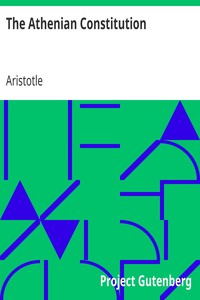| Author |
Aristotle, 385 BCE-323 BCE |
| Translator |
Kenyon, Frederic G. (Frederic George), Sir, 1863-1952 |
| Title |
The Athenian Constitution
|
| Credits |
Produced by Al Haines
|
| Summary |
"The Athenian Constitution" by Aristotle is a historical account written in the 4th century BC. The work explores the political structure and evolution of Athenian democracy, detailing the various systems of government that have existed in Athens from its inception through to Aristotle's time. The text likely serves as a guide to understanding the complex nature of Athenian politics, highlighting key figures and reforms, particularly that of Solon, who is pivotal in the transition toward a more democratic system. At the start of this work, Aristotle outlines the turbulent history of Athens, noting the initially oligarchical constitution and the struggles between social classes, particularly the ruling elite and the disenfranchised poorer citizens. He recounts the significant events that led to the establishment of Solon as a mediator during civil unrest, resulting in major reforms aimed at alleviating debt and servitude among the populace. The opening sections introduce key positions within the ancient governmental structure, such as the offices of King, Polemarch, and Archon, and the significant role of the Council of Areopagus, effectively setting the stage for a deeper examination of the subsequent developments in Athenian governance. (This is an automatically generated summary.)
|
| Language |
English |
| LoC Class |
JC: Political science: Political theory
|
| LoC Class |
PA: Language and Literatures: Classical Languages and Literature
|
| Subject |
Classical literature
|
| Subject |
Constitutional history -- Greece -- Athens -- To 146 B.C.
|
| Subject |
Athens (Greece) -- Politics and government -- Early works to 1800
|
| Category |
Text |
| EBook-No. |
26095 |
| Release Date |
Jul 21, 2008 |
| Most Recently Updated |
Jan 3, 2021 |
| Copyright Status |
Public domain in the USA. |
| Downloads |
580 downloads in the last 30 days. |
|
Project Gutenberg eBooks are always free!
|

